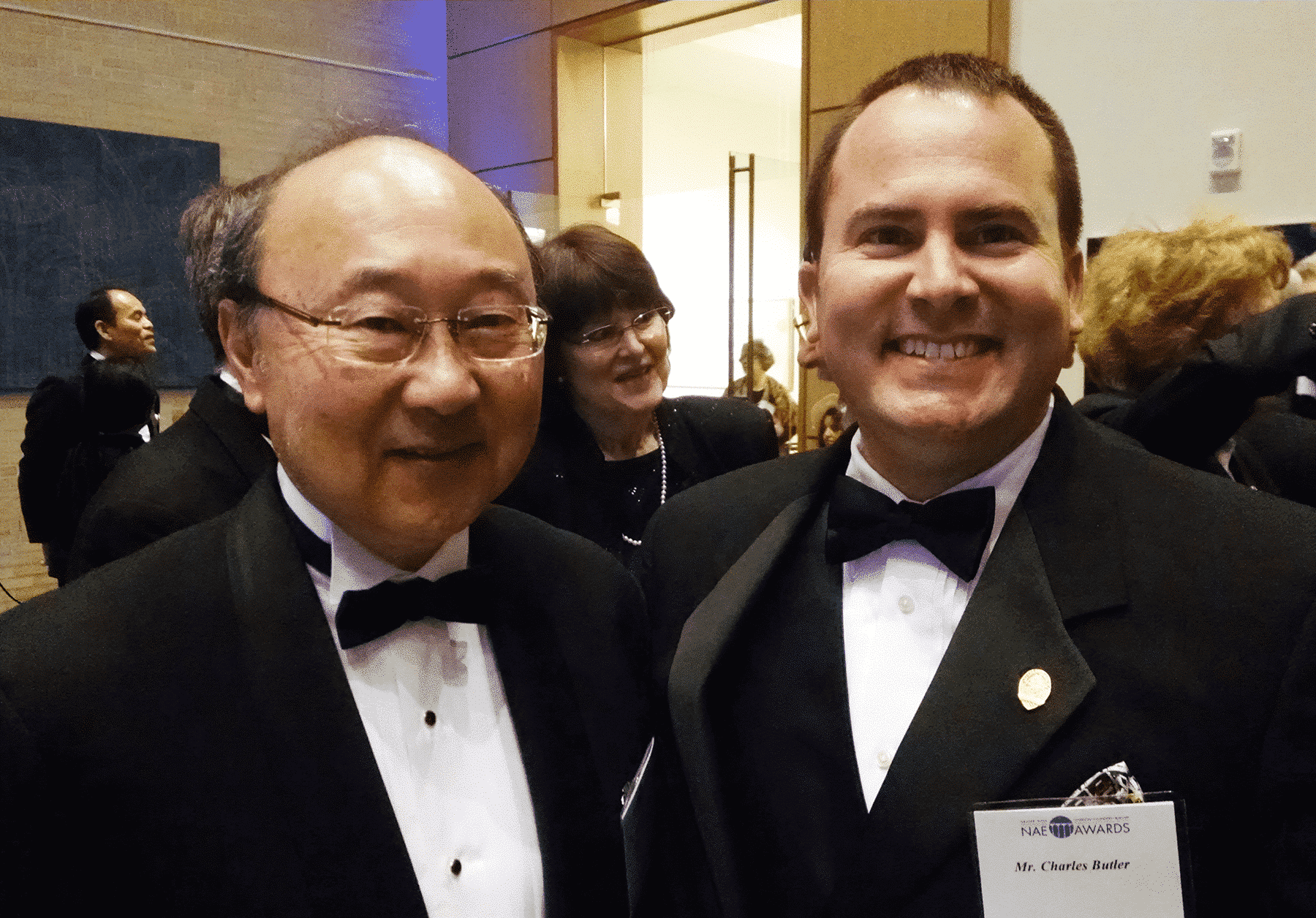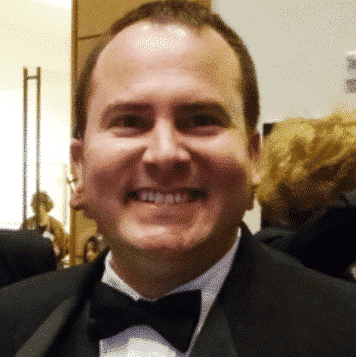
MED-EL
Published Mar 18, 2015 | Last Update Aug 30, 2024
Cochlear Implant Story: A Real-Life Robocop
Chuckie is the recipient of a MED-EL cochlear implant. He lost his hearing due to meningitis when he was just 1 year old. Read how finally getting implanted helped fulfil his dream of being a police officer.

Growing Up With Hearing Loss
I was born with normal hearing, but when I was 1 year old, I had an extremely high fever which caused nerve damage and therefore a hearing loss.
I don’t remember much about it, since it happened when I was so young. My mom told me that it was meningitis and that I had a temperature of 107° F. My dad told me how the doctors put me into a bathtub filled with ice in an attempt to bring my temperature down.
As soon as my parents realised that I had a hearing loss they fitted me with hearing aids. I apparently hated them (the hearing aids, of course) and would frequently dump them into the toilet or into the trash. We lived in Chicago at the time and I attended a deaf school for my kindergarten. The next summer my family moved to a small town in southern Illinois, and when I enrolled into 1st grade there were no specialised schools in the area. I was doing much better with my hearing aids, so it had been determined that I didn’t need the special attention and/or treatment afforded to students in a deaf school.
Hearing Aids for Deteriorating Hearing
I was still wearing hearing aids when I started my job at the Indiana State Excise Police Department, 14 years ago. At that time, I was perfect at reading lips and did marginally on the phone and even less so on the radio. I did just fine during details and had no issues but my hearing started to deteriorate more rapidly as time wore on. Communicating on the radio was difficult enough and talking on the phone was getting worse.
My Major at the time was in charge of our department insurance and had advised me that our plan offered alternatives if I wanted to explore them. In the meantime, my department was very committed to my success and provided me with a Teletypewriting Device (TTD) to use while at the office but also relegated me to only working daytime hours in a limited duty status. I hated this period with a passion but my hearing had deteriorated quite a bit by this time and I had no choice. By then, I had been wearing hearing aids for 28 years and did very well with them until my hearing deteriorated.
Since my hearing had deteriorated significantly and hearing aids were no longer providing me with the information that I needed to receive, I started exploring other options as my insurance coverage was generous enough to cover it. Additionally, having good hearing is important to law enforcement for a variety of reasons and I needed to find something that would work for me so that I could continue to pursue my lifelong dream of being a police officer.
A New Idea: the Cochlear Implant Story
In early 2003, I met with Dr. Miyamoto (that’s him in the photo above) and his team at the IU-Riley Hospital in Indianapolis, where I went through a testing and evaluation process in order to ascertain whether or not I was a candidate for a cochlear implant. This is when I’d first learned about cochlear implants and I did as much research as I possibly could on the science itself as well as on the three manufacturers.
I chose MED-EL for a number of reasons—one of was because

"I saw that MED-EL is a highly research-driven company and therefore you can expect a very reliable product that is very user-friendly. "
Chuckie
CI recipient and police officer
I read how they develop their new processors with “backwards compatibility” in mind so that no matter when you were implanted, you will always be able to use the latest processors and equipment. Additionally, I felt that MED-EL’s atraumaticity was very important to me in case I ever needed to be re-implanted (due to injury, illness, etc.).
I was implanted in August, 2003, and was activated a month later. Having had the benefit of hearing with hearing aids previously, my initial activation was not as significantly “life-altering” like the videos you see on the internet where people are hearing for the first time—mine was more of slight disappointment as the “tuning” of my current map was so far off that my beautiful wife’s voice sounded like Donald Duck and it was so grating to me. I had high expectations when I walked in that morning and left feeling very disappointed.
Fortunately, my audiologist was AWESOME and worked with me for 2 days while we found a mapping strategy that sounded “normal” to me while my brain got used to the new method of information. I struggled with it for the first year but stuck with the program by regularly working on my rehab (speech therapy, etc.).
"Sometime in the spring the following year, I seem to have had an “A-ha!” moment and everything just clicked in place and I’ve done excellent with my implant since."
“The Cochlear Implant is an Amazing Device”
Having the implant has allowed me to flourish as a police officer and I strive, every day, to be the best police officer that I can be. I’ve been a police officer for 14 years now and have been selected as Officer of the Year seven times (two as Educator/Public Information Officer of the year). I have led the state in activity for years (arrests, seizures, violations, etc.) all while maintaining special assignments as an FDA Inspector and as a Firearms Instructor.
I am completely independent now as my CI has helped me understand the radio traffic more accurately while I’m on patrol and gives me the ability to communicate better with the public that I serve.
I am currently a firearms instructor and am certified to teach handgun training, shotgun training, less-lethal training, and patrol rifle training, which happens to be my favorite. I am also an EVO instructor (emergency vehicle operations) and I recently became a Senior Instructor where I teach veteran police officers who wish to become instructors on how to be instructors.
My CI has given me the confidence that is needed in order to speak to large groups of people, many of whom I have never met before, and to effectively communicate a specific curriculum to them while effectively answering their questions.
My cochlear implant has afforded me the ability to function as well as any other hearing person functions. I used to be dependent on others for help when it came to hearing-type tasks, such as phone communications. With my OPUS 2, I can use my FineTuner to discreetly switch to the telecoil and listen on the phone in extremely noisy environments where hearing people can’t (i.e.: during our Super Bowl details in downtown Indianapolis, other Officers looked to me to run information with Dispatch on the phone since it was so loud and I had no difficulties doing so since I could tune out the noise).
"The cochlear implant is an amazing device and its ability to help is astounding."
One thing I think everyone should know about my CI (and anyone else’s CI, for that matter) is that it is not a simple “plug and play” device like a new TV or like a new toaster. It is a complex technology that provides me with the miracle of hearing, and it takes time and practice to be able to use it as effectively and accurately as I do. This training never ends and if you don’t adhere to a specific training regimen, you will not be able to experience all of the benefits that a CI has to offer.
Even though you never stop training, the rewards in hearing well are substantial and worth every effort.
Thanks, Chuckie!
References

MED-EL
Was this article helpful?
Thanks for your feedback.
Sign up for newsletter below for more.
Thanks for your feedback.
Please leave your message below.
Thanks for your message. We will reply as soon as possible.
Send us a message
Field is required
John Doe
Field is required
name@mail.com
Field is required
What do you think?
© MED-EL Medical Electronics. All rights reserved. The content on this website is for general informational purposes only and should not be taken as medical advice. Contact your doctor or hearing specialist to learn what type of hearing solution suits your specific needs. Not all products, features, or indications are approved in all countries.
Marla
June 08, 2023
Hello My son is a CI recipient (implanted at age 1 and is now 21) and interested in law enforcement and we came across this article. We would love to visit with you more. One thing he is concerned about is carrying a taser gun. In our state, in order to be able to carry a taser, you have to be tased yourself. We are trying to find out if this would do damage to the implant or not before proceeding. Can you please let us know if you have any information on this process?
MED-EL
June 14, 2023
Marla, thank you for your question. Taser guns use electric charges to disrupt muscle, brain, and neural systems. It may definitely affect the implant causing device dysfunction. Because of this, we don't recommend using taser guns on our users. Kind regards, Alicia

MED-EL

MED-EL



Conversation
1 Comment